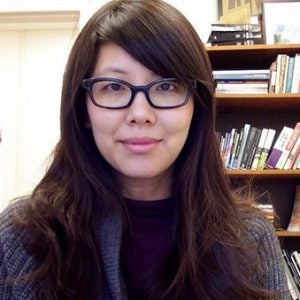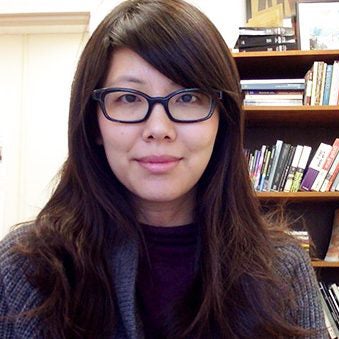 Dr. Christine Mok is the newest faculty member in the English department. After three semesters teaching at the University of Rhode Island, she is able to honestly say that it was the easiest transition that anyone could imagine and that it is wonderful being in our department. Before she joined us, she was a faculty member at the University of Cincinnati in Ohio for four and a half years. One of the things that made her transition seamless was moving from one state institution to another. However, Mok is quick to point out that our department is extremely collegial and that class sizes tend to be much smaller than other state institutions. One of the few things that was difficult in the transition was this issue of scale. Rather than teaching to a large lecture hall with 150 students and 6 graduate teaching assistants, classes are smaller and offer the chance for meaningful interaction between instructors and students. Though this required Mok to adjust her projection and classroom presence, it was far outweighed by her excitement to return to Rhode Island. Another reason this transition was simple was that Mok completed her PhD at Brown in Theatre and Performance Studies.
Dr. Christine Mok is the newest faculty member in the English department. After three semesters teaching at the University of Rhode Island, she is able to honestly say that it was the easiest transition that anyone could imagine and that it is wonderful being in our department. Before she joined us, she was a faculty member at the University of Cincinnati in Ohio for four and a half years. One of the things that made her transition seamless was moving from one state institution to another. However, Mok is quick to point out that our department is extremely collegial and that class sizes tend to be much smaller than other state institutions. One of the few things that was difficult in the transition was this issue of scale. Rather than teaching to a large lecture hall with 150 students and 6 graduate teaching assistants, classes are smaller and offer the chance for meaningful interaction between instructors and students. Though this required Mok to adjust her projection and classroom presence, it was far outweighed by her excitement to return to Rhode Island. Another reason this transition was simple was that Mok completed her PhD at Brown in Theatre and Performance Studies.
If you had asked Christine Mok if she planned to be an academic up until partway through her MFA, her answer would have been no.
Growing up in New York City, she was always academically inclined. Her parents both have graduate degrees, father completed business school and her mother was a pharmacist but as one of the “children of 1965,[1]” she deviated from her parents’ comfort zones of science and business by excelling in English and the arts. She partly credits this to the fact that she was always reading age-inappropriate books; her mother would read Mok Jane Eyre and Charles Dickens because those were the books she had loved. She went to college at Dartmouth, assuming she would be an English major and focus in Modernism, a field she had found interesting at Horace Mann High School.
Once in college though, she found the English major to be boring and instead found herself interested in theatre classes. She discovered her interest in theatre when Mok took the advice to choose courses based on the professor rather than the subject and enrolled in Traditional Asian theatre. It was in this course that she found herself not only interested but also challenged; theatre is an art form that exists in space and time and allowed Mok space to push her understanding. As a double major in English and Theatre, she still did not see herself as an academic and applied to several law schools and the Yale School of Drama in Dramaturgy and Dramatic Criticism. She was told that she was either a shoo-in or that she would never get in; the school only accepts up to three students per specialty each year.
At this point, Mok saw a pathway forward; she could imagine living a life of the theatre. She had loved fashion in high school and had become interested in theatre as an art form in college, and now wanted to cultivate her own voice in dramaturgy and criticism. The Yale School of Drama has a conservatory model and Mok pursued her MFA learning theory and participating in workshops for writing alongside working on productions and the student cabaret, a completely student-run theatre that existed alongside the official productions. It was in this collaborative creative culture that Mok also discovered she liked teaching. Initially, she planned to pursue a Doctor of Fine Arts at the Yale School of Drama after finishing her MFA, but concerns such as funding and work-life balance led her to transfer to Brown, where she completed her PhD. It was here that she crystallized her academic interests, Asian American Literature & Performance; Critical Race Studies; Modern & Contemporary theatre; Performance Studies; and Critical Theory, that had been emerging throughout her life.
In addition to her scholarly work, Christine Mok has kept one foot in the theatre world. She has served as a dramaturg, a literary adviser in a theatre, on productions such as Madama Butterfly (Opera Theatre of St. Louis), Joseph Ngo’s Word Words (Barn Arts) and Frances Ya-Chu Cowhig’s Snow in Midsummer (OSF) and as a designer on Octavio Solis’s Dreamlandia (Brown University), Marcus Gardley’s The Road Weeps, The Well Runs Dry (Brown University), and Charise Castro Smith’s The Hunchback of Seville (Brown/Trinity Rep). She is also a founding member of Wingspace, an organization of theatre artists that fosters conversations on design, strengthens the theatre community, and furthers activism in the field. This group was started when Mok and her colleagues from Yale School of Drama wanted a collaborative, studio model for their freelance work in the New York City theatre scene. The collaborative holds salons on topics in design every Monday and has a mentorship program to elevate talented young artists with limited access to traditional professional networks and resources. While she views herself as an academic now, it would a mistake to say that Mok has not at least partially continued on the path she saw for herself when entering Yale.
Looking forward, Mok is working on her first book project, Disorientations: Performance & Racial Form in Asian America. She describes the project as “drawing out disruptive aesthetic strategies used by Asian American artists and cultural producers who reject the standards of respectability and authenticity that mark model minority identities. Eschewing authenticity, writers and artists such as Young Jean Lee, Nikki S. Lee, Anicka Yi, Maxine Hong Kingston, and Viet Thanh Nguyen, employ failure as a dramaturgy for racial identity and identification to capture experiences that lie beyond the edges of mainstream, well-assimilated, upwardly mobile Asian America. Drawing from an archive that ranges across literature and theatre to photography and dance, Disorientations tracks the changing political and aesthetic claims that contemporary Asian American cultural production makes for the theatre to illuminate modes of subject formation and social critique defined by a refusal of identitarian coherence that nonetheless imagine Asian American affiliation and possibility.”
Mok offers this advice to graduate students looking at the job market. While there are concrete things to do to make one the best candidate possible, there are a number of elements that are out of the candidate’s control, equal parts “luck and nonsense.” Academia asks you to constantly do more, but you also have the ability to control your time. You should not only seek to fill your CV but make a coherent story of yourself as a scholar so that you are legible to others. We are excited to see what Mok’s time at URI will bring.
1. “Children of 1965” refers to the Immigration and Naturalization Act of 1965 (The Hart-Celler Act) which set in place the quota system that prioritized certain countries and skilled and educated immigrants for entry into the United States. This particular phrase comes from The Children of 1965: On Writing, and Not Writing, as an Asian American by Min Hyoung Song.

